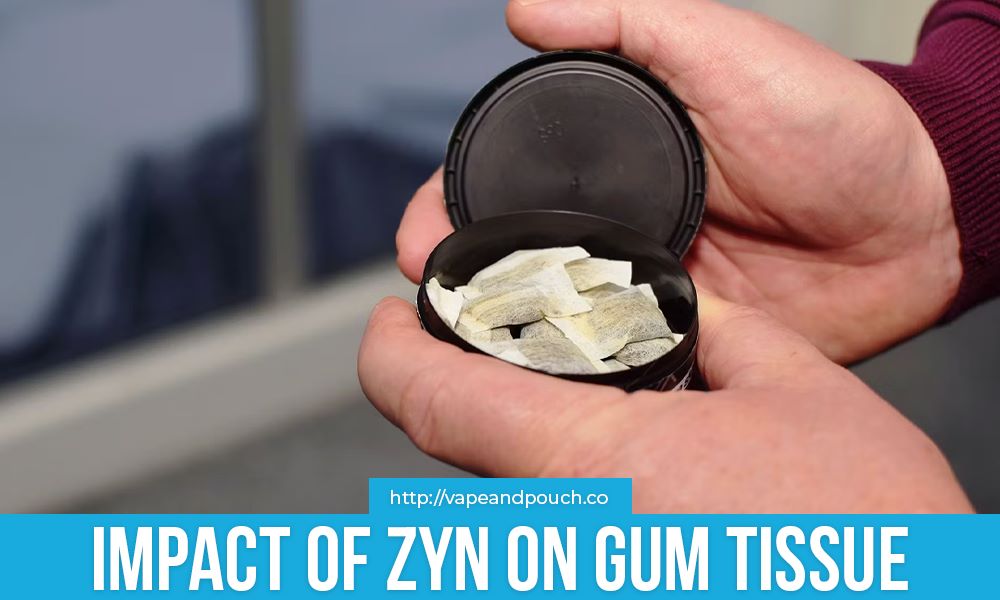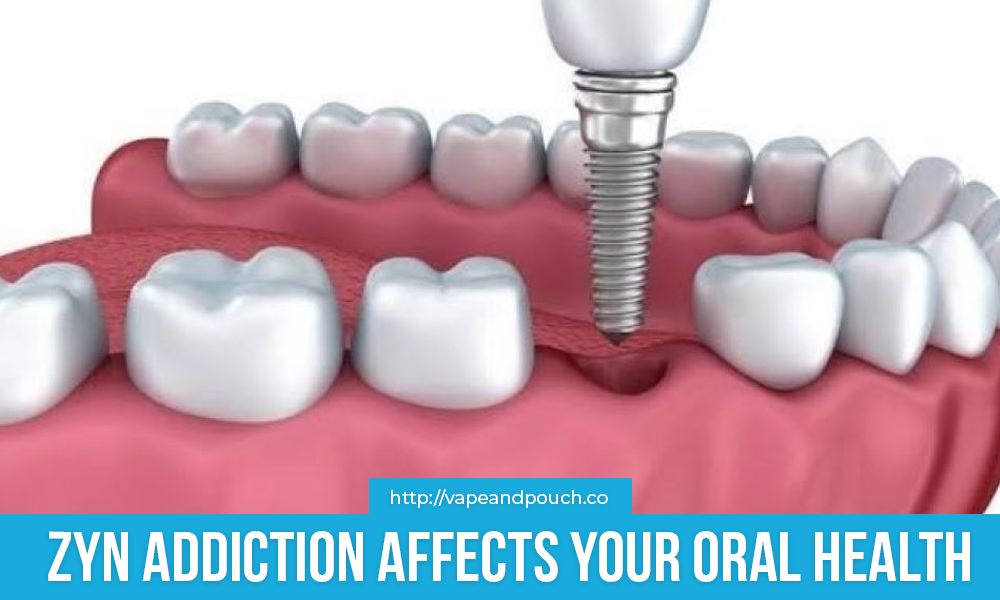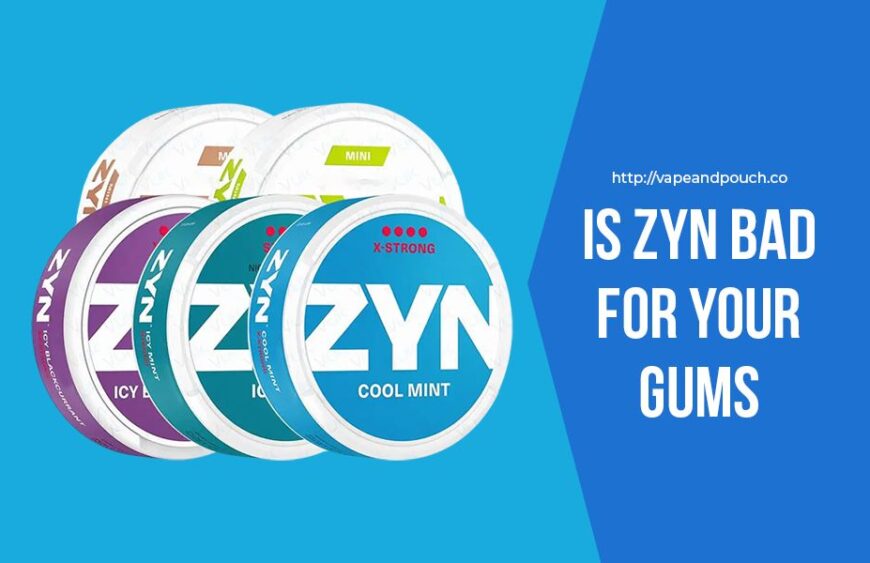ZYN pouches have grown in popularity across Canada as a cleaner, tobacco-free way to get nicotine without lighting up. They’re discreet, flavorful, and smokeless, but are they truly harmless? One question looms large: Is ZYN bad for your gums? Let’s explore what these pouches do to your mouth and what you should know before your next pouch.
What Are ZYN Pouches and How Do They Work?
Is ZYN bad for your gums, that’s what we’ll be finding out. ZYN pouches are small, white, tobacco-free nicotine products placed between the gum and lip. They release nicotine through the oral tissue, delivering a buzz without smoke or spit. Popular in Canada, especially among younger adults, ZYN comes in flavors like Citrus, Cool Mint, Coffee, and Spearmint. Each pouch also varies in nicotine strength.
Although ZYN avoids the harsh chemicals of combustion, it doesn’t mean it’s risk-free, especially when it comes to your oral health.
Do ZYN Pouches Harm Your Gums?
Many users turn to ZYN believing it’s a safer alternative. But while it skips tobacco leaves, it still contains nicotine and a mix of other ingredients that may irritate the mouth.
Do All Nicotine Pouches Damage Your Gums?
While ZYN pouches may appear cleaner than traditional tobacco products, they are still nicotine delivery systems—and that comes with potential risks to your oral health.
ZYN Effects on Oral Tissue
Nicotine constricts blood vessels, which reduces circulation in the gums. Less blood flow means slower healing and increased vulnerability to damage and disease.
Irritation & Inflammation
Users often report gum soreness, slight swelling, and sensitivity—especially when placing pouches in the same spot. Over time, this can lead to ZYN gum damage.
ZYN Gum Bleeding and Sores
Some users experience gum bleeding, dry mouth, or even mouth sores after frequent use. These symptoms indicate irritation and possibly the onset of gum recession.
Other Ingredients
While ZYN pouches don’t have tobacco, they contain other ingredients like pH adjusters, sweeteners, and fillers that could irritate gum tissue. Prolonged exposure can lead to soreness or inflammation.
Impact of ZYN on Gum Tissue

Decreased Blood Flow
ZYN in ZYN pouches reduces circulation in the gums, which weakens their ability to repair themselves and fight off infections.
Dry Mouth
ZYN can lead to dry mouth, creating a perfect environment for bacteria to thrive. This increases the risk of gum disease and tooth decay.
Irritation and Inflammation
Some users experience gum soreness or even slight swelling where the pouch sits. Long-term exposure may lead to lasting irritation.
Chemical Exposure
Besides ZYN, ZYN pouches contain artificial sweeteners and stabilizers. These may not be as harmful as tobacco but could still contribute to oral discomfort.
ZYN Gum Recession: A Common Concern
One of the most reported oral issues from ZYN users is gum recession. Repeatedly placing pouches in the same spot can stress the soft tissue and cut off blood circulation. Over time, this causes the gums to pull away from the teeth, exposing the roots and leading to sensitivity or decay. Unfortunately, ZYN gum recession is permanent once it begins.
MD Anderson – What to Know About Nicotine Pouches
What Is Gum Recession?
Gum recession happens when the soft tissue pulls away from the teeth, exposing the root. Once this occurs, the tissue won’t grow back.
Risks of Gum Recession
Exposed tooth surfaces become more sensitive and prone to decay. Gum recession also increases the risk of infection and periodontal disease.
Periodontal Disease
Without healthy gums, bacteria can invade deeper into the oral tissue, leading to chronic infections and, in severe cases, tooth loss.
ZYN Gum Disease Risks
Even though ZYN is tobacco-free, it still delivers nicotine, which constricts blood vessels and weakens your gums’ natural ability to heal. This creates a breeding ground for bacteria and inflammation, which may lead to ZYN gum disease such as gingivitis or, worse, periodontitis.
Nicotine Pouches Side Effects on Oral Health
Nicotine pouches, including ZYN, may cause several side effects for the mouth and gums. These include dry mouth, irritation, sensitivity, and in some cases, oral lesions. Over time, this can contribute to a decline in oral hygiene and discomfort during regular activities like eating or brushing.
- Bad Breath: Dry mouth and irritation can lead to persistent bad breath.
- Mouth Sores: Some users report sores or discomfort from frequent pouch use.
- Altered Cells and Cancer Risks: ZYN has been linked to changes in oral tissue that could raise concerns about long-term effects, including cancer risks.
Healthline – Nicotine Pouches: Side Effects
ZYN Pouches vs. Traditional Tobacco Products
ZYN vs Chewing Tobacco
ZYN is often compared to chewing tobacco because both are smokeless. While ZYN avoids harmful tobacco toxins, it still delivers nicotine, which can irritate the gums. Chewing tobacco is worse in terms of cancer risk and gum destruction, but ZYN gum damage is still a concern.
Nicotine Pouches vs Chewing Tobacco
Like ZYN, other nicotine pouches (VELO, Rogue) are marketed as safer. But their effect on gums, gum recession, irritation, or even nicotine pouch gum disease, can mirror traditional tobacco with enough use.
Are Nicotine Pouches Bad for Teeth?
They don’t stain teeth like tobacco, but they may still cause gum recession, which leads to tooth exposure and decay. So yes, ZYN may be bad for your teeth indirectly.
Tobacco-Free Label
ZYN pouches are marketed as a tobacco-free option, but that doesn’t mean they’re completely risk-free. ZYN itself carries its own health concerns.
Comparison with Smoking and Snus
While they don’t expose the lungs to smoke, they can still impact oral health, much like traditional smokeless tobacco products such as snus®.
Health Risks of ZYN
No matter the delivery method, ZYN can lead to addiction and long-term damage to oral tissues.
How ZYN Addiction Affects Your Oral Health

This is how ZYN addiction affects gum health even if used sparingly, ZYN contains enough nicotine to cause dependence. As tolerance builds, users may increase frequency or strength, exposing gum tissue more often and more aggressively.
ZYN Addiction
ZYN pouches contain enough ZYN to cause dependency. Many users find themselves increasing their intake over time. Check this article out if you want to know more about how ZYN would make you feel — HERE
Can ZYN Cause Mouth Sores?
Yes, ZYN mouth sores have been reported by users, particularly those who use stronger strengths or keep the pouch in for long periods. Irritation from the pouch ingredients (like pH adjusters or artificial sweeteners) can create small ulcers or burning sensations inside the mouth. If left untreated, these sores can worsen and lead to infection.
Cumulative Damage
Frequent use adds up, and the more pouches used, the greater the risk to gums, teeth, and overall oral health.
- Continuous pouch placement wears down gums
- Saliva reduction leads to plaque buildup
- Dependency increases long-term risks for nicotine pouch gum damage
Types of ZYN Products
ZYN is available in various forms, each with its own method of delivery and impact on health. Some of the most common types include:
- Cigarettes: A traditional ZYN source that delivers the substance through smoke, exposing users to tar and harmful chemicals.
- Cigars: Larger than cigarettes and often containing higher ZYN levels, increasing health risks.
- Snus: A moist tobacco product placed under the lip, popular in Sweden and now gaining traction in the U.S.
- Chewing Tobacco: Loose-leaf or plug tobacco that is chewed to release ZYN.
- ZYN Pouches: Tobacco-free products designed to deliver ZYN through the oral mucosa.
- ZYN Gum: A chewable option that provides a rapid ZYN dose to ease cravings.
- ZYN Lozenges: Dissolvable tablets that slowly release ZYN into the bloodstream.
- ZYN Patches: Adhesive patches applied to the skin to deliver ZYN over an extended period.
- E-cigarettes: Battery-powered devices that vaporize ZYN liquid, providing a smoke-free alternative.
- Vape Pens & Mods: Advanced vaping devices that allow users to customize ZYN intake.
- ZYN Sprays: Fast-acting sprays used orally or nasally to quickly deliver ZYN.
- ZYN Inhalers: Devices that replicate the sensation of smoking, often used for smoking cessation.
Regardless of the form, ZYN use carries health risks. It negatively impacts gum health, increases disease susceptibility, and can contribute to long-term oral and systemic issues.
Breaking Down Myths About ZYN Pouches
Myth 1: ZYN Pouches Are Completely Safe
False. Tobacco-free doesn’t mean risk-free. ZYN side effects still include gum irritation, recession, and mouth sores.
Myth 2: ZYN Pouches Don’t Cause Addiction
ZYN is highly addictive, and ZYN® pouches can lead to dependency just like other ZYN products.
Myth 3: ZYN Is Healthier Than Smoking
Only partially true. You avoid lung damage, but oral risks remain, especially to your gums and teeth.
Do All Nicotine Pouches Damage Your Gums?
ZYN isn’t alone. Nicotine pouches gum recession and side effects are concerns tied to many pouch brands. While each has different additives, the consistent exposure to nicotine and pH adjusters in the mouth can wear away soft tissue over time.
If you’re using any nicotine pouch, the risks include:
- Tissue irritation
- Gum swelling and bleeding
- Reduced saliva flow
- Long-term gum health degradation
Is ZYN Bad for Teeth?
Although ZYN pouches don’t stain teeth like tobacco, they may still be bad for your teeth in the long run. As gums recede and the roots become exposed, users are at higher risk for cavities, tooth sensitivity, and even tooth loss. Combine that with dry mouth and bacterial growth, and the damage becomes more than superficial.
Nicotine Pouches Gum Disease & Gum Damage
Whether you’re using ZYN or another pouch brand, nicotine pouches gum damage is quite common by irritating the tissue and reducing natural saliva flow. Reduced moisture makes it harder to wash away food particles and bacteria, leading to plaque buildup and inflammation.
Over time, this contributes to nicotine pouch gum damage, a general term that includes bleeding, recession, tenderness, and increased tooth vulnerability. Regular use increases the odds of permanent damage to your smile.
How to Maintain Healthy Gums
- Good Oral Hygiene: Brushing, flossing, and using mouthwash help reduce gum damage.
- Stay Hydrated: Drinking plenty of water can help counteract dry mouth caused by ZYN.
- Regular Dental Checkups: Catching early signs of gum damage can prevent serious problems.
- Limit ZYN Use: Reducing the frequency of ZYN pouch use can minimize risks.
Why Regular Dental Checkups Matter
Regular Monitoring
Dental checkups help detect gum issues before they become severe.
Professional Cleaning
A deep cleaning can remove bacteria buildup and reduce the effects of ZYN exposure on oral tissues.
Protect Your Oral Health Today: Book a Visit!
Taking care of your gums is essential. If you use ZYN pouches, it’s even more important to see a dentist regularly. Schedule a checkup today to keep your oral health on track.
Final Thoughts: Is ZYN Bad for Your Gums?
Yes, it can be. While ZYN avoids many dangers of traditional tobacco, it still poses risks to your gum health. From irritation and dry mouth to gum recession and potential nicotine pouch gum disease, ZYN users should take oral care seriously.
If you’re using ZYN pouches, monitor your gums, stay on top of dental hygiene, and talk to your dentist about your concerns. Your gums may not bleed today, but they might recede tomorrow.








How ZYN Makes You Feel? - Vape & Pouch
April 5, 2025 at 3:08 pm[…] against your gums, and over time, it can cause sensitivity. I can see why some people ask, “Is ZYN bad for your gums?” I tried rotating placement under my lip to minimize […]